- The Early Years1928-1949
- The Evolution1950-1969
- The Rise1970-1979
- The Growth1980-1999
- Today's Game2000 and Beyond
Arthur F. Driscoll elected FMTC President (1923-1924). A period of fun and tennis in the roaring ’20s
Back to Top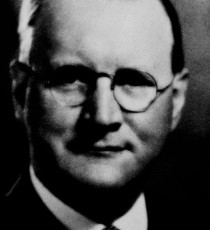
While there were behind-the-scenes difficulties in raising enough cash to build a clubhouse and new courts, for most members the 1920s were a time of good fun and good tennis. Pressure for court time in 1923 produced a rule that members could not bring as playing guests any nonmembers who lived in Scarsdale. Though life-styles were changing, reminders of times past were very much in evidence on the Club grounds. Near the tennis courts there still were sheds for carriages, and when members played tennis, they still wore the costumes of a more genteel era: long sleeves, long skirts, long trousers. "I always wore at least two of my prettiest lace-trimmed petticoats," says Blanche Mason Starkweather of the costume a fashion-wise young lady wore for tennis at the Club circa 1921. "They came to the ankles, and of course when I ran for the ball, the lace showed." Two notices about wome[...]
Read MoreAlfred W. Haywood elected FMTC President (1925)
Back to Top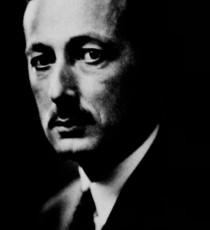
Haywood was a native of North Carolina and studied law at the University of North Carolina and at Columbia University. He move to Scarsdale in the early 1920s and lived at 1000 Post Road. He became a member of the New York City law firm Moore, Hall, Swan & Cunningham in 1929 (Warren Cunningham served as mayor of Scarsdale and was also a FMTC member). In 1933 Haywood, who had been a member Scarsdale Board of Education since 1926, was elected President and oversaw the building of the new Scarsdale High School during his tenure. At the time of his election to President of FMTC the Scarsdale Inquirer of March 14, 1925 reported "the report of the treasurer showed the club in fine financial condition with a balance of $900 in the bank."
Read MorePost war boom brings change to Scarsdale life
Back to Top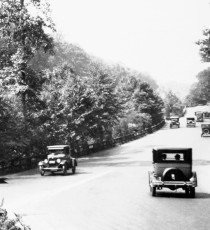
The "war to end all wars" marked a clear dividing line in the tempo and style of Scarsdale life. A postwar building boom redrew the map of the community while land prices climbed sharply. Automobiles began to displace carriages on the town's dirt roads, although cars were still banned from Emily Butler's 500-acre Fox Meadow estate. Visitors were free to stroll, ride horses, or drive carriages on her property, but cars—except those of house-guests—were prohibited on the estate grounds. Even the Fox Meadow estate was shrinking, however, for Miss Butler began to sell and give away bits and pieces of her land. All around the Fox Meadow Tennis Club the sounds of construction could be heard, as roads, schools, and houses were built. Miss Butler sold twenty-five acres between the Club and the Post Road to the Village for Scarsdale's first public high school, which opened in 1919, a[...]
Read MoreFormer FMTC member, Dr. George King, beats former national tennis champion and Davis Cup star
Back to TopKing was made an honorary member of FMTC in 1928. He had played at the club for many years before moving into New York City
Read MoreRudolph C. Culver elected FMTC President (1926-1930)
Back to Top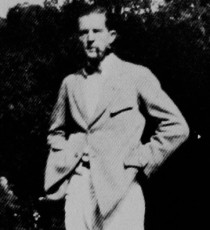
Rudolph C Culver (1883-1936) was president of Realty Brokerage firm Culver, Hollyday & Co. in New York City and an expert in cooperative apartments.
Read MoreA clubhouse needed but raising money difficult; controversial land sale in 1926 to raise funds resulted in a number of member resignations but ultimately made the clubhouse a reality
Back to Top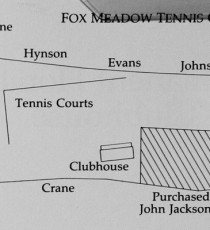
For four years the Club tried to raise enough money for a clubhouse by selling stock, but it was unsuccessful. At the 1926 meeting of the Tennis Club, John Jackson proposed another means of getting cash: He moved that up to an acre of the Club's property be sold to raise money to build a clubhouse and new tennis courts. It is clear that the proposed land sale provoked considerable debate. Four of seven directors of the Tennis Realty Corporation, among them President Pfeiffer, Jackson, Kent, and Stowell, resigned from the board. Although resignations signed by Jackson and Stowell dated July 26, 1926, are in the minute’s books, both are listed as present for a special meeting of the Tennis Realty Corporation on that date. A draft of the minutes says the board discussed an offer of $10,000 from John Jackson to buy the southern half of land facing Church Lane, which he would use as a ho[...]
Read MoreA new era dawns with the opening of the new clubhouse in 1927
Back to Top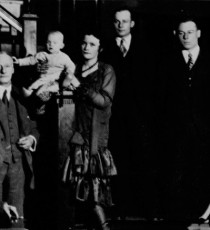
Club Secretary Hynson spoke of a “renewal of activity worthy of the traditions of the oldest tennis club in Westchester County.” By June 1927 the directors were able to report: “On the strength of the new clubhouse and the good management of our officers, we have obtained about twenty-five or thirty additional active members” for a total of about one hundred active members. The plan was for a club of between 125 and 150 members “to guarantee us an income sufficient to pay the fixed charges and relieve us of the necessity of selling more property.” Sally Jackson Rasmussen, who grew up in the new Jackson house on Church Lane, says that it always seemed to her to be sunny and peaceful at Fox Meadow Tennis Club. From the house, the Jacksons could see not only the Club, but the cows and sheep grazing next to it on Crane Meadow. “There was nothing but sheep, cows, and the [...]
Read MoreThe dream realized – new courts and a clubhouse open in 1927
Back to Top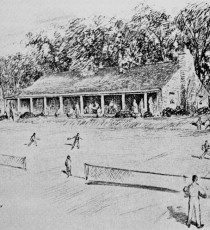
To celebrate, a full day of exhibition matches was planned for June 26, 1927. A number of notable players from around the country agreed to appear. Alas, rain fell the preceding night, turning the courts into quagmires. The skies cleared briefly about 9 a.m., renewing hope that the matches could be held. The courts were rolled once again, and the lines were redrawn. Another cloudburst erased the lines. Some of the visiting players suggested that, before rolling the courts again, Club officials burn off the dampness by pouring gasoline on the courts and lighting a fire. This was done, and finally, at 4 p.m., nearly 250 patient spectators were able to watch a match between Beryl Robinson, the Bermuda champion, and Mrs. Russell Downe of Greenwich. They played only one set on the still-slippery court, and Downe won 7-5. After a men's doubles match, the crowd watched the day's highlight, [...]
Read MoreHelen Wills plays an exhibition match at Fox Meadow
Back to Top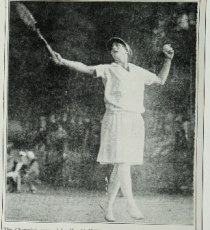
Scarsdale Inquirer October 21, 1927
Read More



